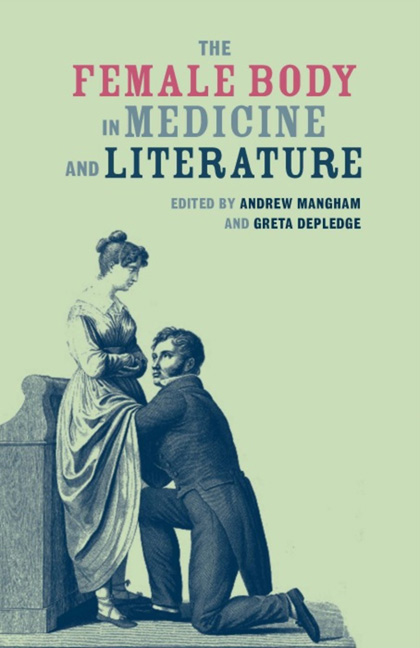Book contents
- Frontmatter
- Contents
- Acknowledgements
- Notes on Contributors
- 1 Introduction
- 2 ‘Difficulties, at present in no Degree clear'd up’: The Controversial Mother, 1600–1800
- 3 Monstrous Issues: The Uterus as Riddle in Early Modern Medical Texts
- 4 Surveilling the Secrets of the Female Body: The Contest for Reproductive Authority in the Popular Press of the Seventeenth Century
- 5 ‘Made in Imitation of Real Women and Children’: Obstetrical Machines in Eighteenth-Century Britain
- 6 Transcending the Sexed Body: Reason, Sympathy, and ‘Thinking Machines’ in the Debates over Male Midwifery
- 7 Emma Martin and the Manhandled Womb in Early Victorian England
- 8 Narrating the Victorian Vagina: Charlotte Brontë and the Masturbating Woman
- 9 ‘Those Parts Peculiar to Her Organization’: Some Observations on the History of Pelvimetry, a Nearly Forgotten Obstetric Sub-speciality
- 10 ‘She read on more eagerly, almost breathlessly’: Mary Elizabeth Braddon's Challenge to Medical Depictions of Female Masturbation in The Doctor's Wife
- 11 Mrs Robinson's ‘Day-book of Iniquity’: Reading Bodies of/and Evidence in the Context of the 1858 Medical Reform Act
- 12 Rebecca's Womb: Irony and Gynaecology in Rebecca
- 13 Representations of Illegal Abortionists in England, 1900–1967
- 14 Afterword: Reading History and/as Vision
- Index
6 - Transcending the Sexed Body: Reason, Sympathy, and ‘Thinking Machines’ in the Debates over Male Midwifery
- Frontmatter
- Contents
- Acknowledgements
- Notes on Contributors
- 1 Introduction
- 2 ‘Difficulties, at present in no Degree clear'd up’: The Controversial Mother, 1600–1800
- 3 Monstrous Issues: The Uterus as Riddle in Early Modern Medical Texts
- 4 Surveilling the Secrets of the Female Body: The Contest for Reproductive Authority in the Popular Press of the Seventeenth Century
- 5 ‘Made in Imitation of Real Women and Children’: Obstetrical Machines in Eighteenth-Century Britain
- 6 Transcending the Sexed Body: Reason, Sympathy, and ‘Thinking Machines’ in the Debates over Male Midwifery
- 7 Emma Martin and the Manhandled Womb in Early Victorian England
- 8 Narrating the Victorian Vagina: Charlotte Brontë and the Masturbating Woman
- 9 ‘Those Parts Peculiar to Her Organization’: Some Observations on the History of Pelvimetry, a Nearly Forgotten Obstetric Sub-speciality
- 10 ‘She read on more eagerly, almost breathlessly’: Mary Elizabeth Braddon's Challenge to Medical Depictions of Female Masturbation in The Doctor's Wife
- 11 Mrs Robinson's ‘Day-book of Iniquity’: Reading Bodies of/and Evidence in the Context of the 1858 Medical Reform Act
- 12 Rebecca's Womb: Irony and Gynaecology in Rebecca
- 13 Representations of Illegal Abortionists in England, 1900–1967
- 14 Afterword: Reading History and/as Vision
- Index
Summary
By the end of the eighteenth century male physicians had replaced female midwives as the preferred birthing attendants among the aristocracy and wealthy middle class. How the private world of the lying-in, which derived its authority from women's experiential knowledge of birth and reproduction, had become the domain of the male physician is a complicated and yet often over-simplified story. The eighteenth- and early nineteenth-century debates over the man-midwife illuminate complex and competing discourses surrounding the nature of men, women, and the reproductive body. Through an analysis of selected works published during this period, this essay will highlight the ways in which advocates both for and against the use of male midwives drew upon the wider Enlightenment discourses surrounding natural law, sexual difference and reason to bolster their claims. The repositioning of reproductive matters in the public forum entailed new ways of thinking about how the ‘truths’ of the body were to be ascertained. Birth and maternity increasingly came to be defined as matters that could only be fully managed and understood through detailed, objective, and professional learning, rather than through experiential knowledge. As the traditional foundations for female midwifery came under attack it was the man-midwife who was best able to harness the growing faith in reason and science and to position himself as working in the interests of the emergent public sphere.
Scholars such as Lisa Cody have done much to question simplistic explanations for the triumph of the man-midwife in England, highlighting not only their claims to superior anatomical knowledge and skill but also their successful appropriation of qualities more traditionally associated with femininity. Drawing upon the insights of Cody, this essay will further explore the contested ideological terrain of the midwifery debates. Throughout this period male midwives worked hard to position themselves as embodiments of an idealized masculinity; yet their success in this venture depended not only upon their capacity to negotiate and transcend the boundaries of the public and private as Cody maintains but also upon their ability to respond to the virulent attacks of their opponents. Only by analysing the terms of the debate, including the ways in which each side sought to construe itself and its opponent, can the success of man-midwifery be explained.
- Type
- Chapter
- Information
- The Female Body in Medicine and Literature , pp. 89 - 106Publisher: Liverpool University PressPrint publication year: 2012



